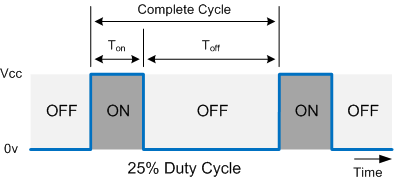PWM Expansion C Library
The Onion Servo (PWM) Expansion library, libonionpwmexp is a dynamic C library that provides functions to setup the Servo Expansion and generate PWM signals.

The library can be used in C and C++ programs.
This library is also available as a module for use in Python. The module is called pwmExp and is part of the OmegaExpansion package.
Programming Flow
After each power-cycle, the chip that controls the PWM Expansion must be programmed with an initialization sequence to enable the on-board oscillator so that PWM signals can be generated.
After the initialization, the other functions can be used to generate PWM signals on specific channels or to change the PWM signal frequency.
Additionally, it is possible to disable to the oscillator, disabling the generation of all PWM signals at once. Before generating new PWM signals, the initialization sequence must be run again.
PWM Signal Refresher
Pulse Width Modulated signals can be described with duty cycle percentages and frequencies/periods:

The duty cycle indicates what percentage of time a signal is on or high voltage.
The frequency determines the overall period of the pulse.
For a more detailed explanation, see the guide on using the Servo Expansion.
Channels on the Expansion
The PWM Expansion has 16 channels that can generate distinct PWM signals. Note that they will all be running on the same frequency.
The C Library
The libonionpwmexp C library is a series of functions that perform all of the actions specified in the Programming Flow section.
Source Code
The source code can be found in the Onion i2c-exp-driver GitHub Repo.
Header File
To add the Onion PWM Expansion Library to your program, include the header file in your code:
Library for Linker
In your project’s makefile, you will need to add the following dynamic libraries to the linker command:
The dynamic libraries are stored in /usr/lib on the Omega.
Example Code
The libonionpwmexp library is used in the implementation of the pwm-exp command line tool..
The source code can be found here, on the i2c-exp-driver Onion GitHub Repo.
Return Values
All functions follow the same pattern with return values:
If the function operation is successful, the return value will be EXIT_SUCCESS which is a macro defined as 0 in cstdlib.h.
If the function operation is not successful, the function will return EXIT_FAILURE which is defined as 1.
A few reasons why the function might not be successful: * The specified device address cannot be found on the I2C bus (the Expansion is not plugged in) * The system I2C interface is currently in use elsewhere
An error message will be printed that will give more information on the reason behind the failure.
Functions
| Function | Prototype |
|---|---|
| Initialization Function | int pwmDriverInit () |
| Check for Initialization | int pwmCheckInit (int *bInitialized) |
| Generate a PWM Signal | int pwmSetupDriver (int driverNum, float duty, float delay) |
| Set PWM Signal Frequency | int pwmSetFrequency (float freq) |
| Disabling the Oscillator | int pwmDisableChip () |
Initialization Function - int pwmDriverInit ()
This function programs the initialization sequence on the Servo Expansion, after this step is completed, the functions to generate PWM signals or change the signal frequency can be used with success:
The oscillator will be setup to generate PWM signals at 50 Hz, the default for most servos.
Check for Initialization - int pwmCheckInit (int*)
This function performs several reads to determine if the Servo Expansion has been initialized and the oscillator is running.
It can be used to check if calling the Initialization function is required.
Arguments
The bInitialized argument is to be passed by reference and once the function executes, it will contain a value that corresponds whether or not the Expansion is currently in the initialized state.
The value follows the table below:
| Initialization Status | bInitialized |
|---|---|
| Not Initialized | 0 |
| Initialized | 1 |
Example
Check if a Servo Expansion is initialized:
Generate a PWM Signal - int pwmSetupDriver (int, float, float)
Here we go! Use this function to generate a PWM signal on a specified channel:
Arguments
The driverNum argument is detemines on which channel to generate the PWM signal. The accepted values are:
| Value | Meaning |
|---|---|
| 0 to 15 | Matches the label on the Servo Expansion |
| -1 | Generates the same signal on all channels |
The duty argument specifies duty cycle percentage for the PWM signal. Accepted values are 0 to 100. Decimal values are allowed.
The delay argument specifies the percentage delay before the PWM signal goes high. Accepted values are 0 to 100 with decimal values being allowed. In normal use with servos this should be set to 0.
Examples
Set channel 0 to a PWM signal with a 50% duty cycle:
Generate a 3.55% duty cycle PWM signal with a 45% delay on channel 7:
Set channel 15 to always on:
Set channel 8 to always off:
Set all channels to a 15.65% duty cycle PWM signal:
Set PWM Signal Frequency - int pwmSetFrequency (float)
The oscillator can be reprogrammed to generate a variety of different frequencies:
This will change the frequency of the PWM signals generated on all of the channels. The oscillator can generate frequencies between 24 Hz and 1526 Hz, the default value is 50 Hz.
Arguments
The freq argument is a floating point number that specifies the frequency. The function will accept any input but the programmed frequency will be clamped between 24 Hz and 1526 Hz.
Examples
Change the frequency to 60 Hz and generate a 40% duty cycle signal on channel 14:
Generate a signal on channel 13, change the frequency to 105.45 Hz, and generate a new signal on channel 13:
Disabling the Oscillator - int pwmDisableChip ()
The oscillator can also be disabled, automatically stopping all PWM signal generation:
This might be useful for disabling PWM signal-driven devices while not powering off the Omega. The initialization function will have to be run before new PWM signals can be generated.